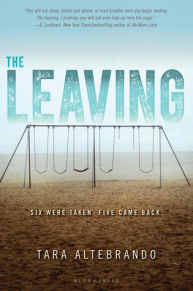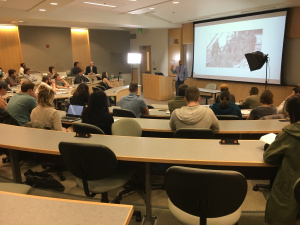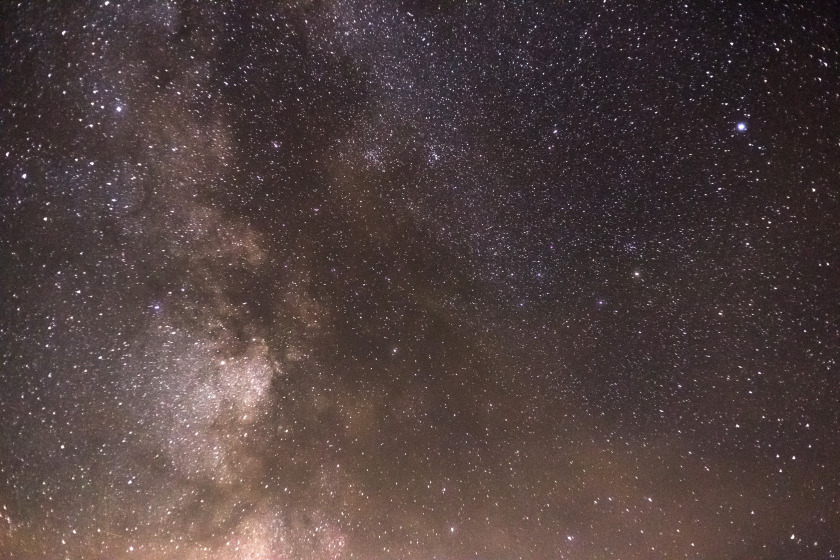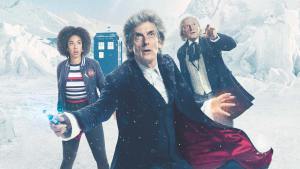 Written by Tom
Written by Tom
A review of the Doctor Who Christmas Special Twice Upon a Time.
I’m going to admit my biases upfront: in my opinion, the Capaldi era has been one of the best eras of Doctor Who ever, second only to the McCoy era. Its ideas have been big and bold (An episode featuring only Capaldi! Space vikings defeated with electric eels! The moon’s an egg!); the politics has been loud and aggressive (Zygons as a metaphor for ISIS! The Doctor punches a racist in the face! The villain of the week is capitalism!) and the show has never looked more beautiful. If you want experimental, progressive, dynamic, interesting storytelling, then the Capaldi era has you covered in spades. Have some bits been a bit rough around the edges? Yes, but that’s what you get for trying to do something as radical as the average Capaldi era episode of Doctor Who twelve times a year with a limited time and budget. OK, so it produced the occasional Sleep No More, Under the Lake/Before the Flood and The Lie of the Land, but it also produced Into the Dalek, Listen, Kill the Moon, Mummy on the Orient Express, Flatline, Last Christmas, The Zygon Inversion/The Zygon Invasion, Face the Raven, Hell Sent, Heaven Bent, The Husbands of River Song, Oxygen, Extremis, and World Enough and Time/The Doctor Falls – and those are only the ones I consider to be stone cold classics. All good things have to end though, so it is that we bid goodbye to Peter Capladi on-screen and Steven Moffat off-it.
The episode itself uses the structure last seen in The Husbands of River Song in which a romp suddenly gives way to a poignant ending during its last minutes, a structure which works for Christmas specials as it allows Moffat to play things broadly for the non-fan, half-drunk-and-tired Christmas crowd and pull them along until suddenly hitting them with emotion. The result is Christmas-worthy fluff that nevertheless ends focused and emotional, allowing us to have a mix of the fun and the funereal which predominately focuses on the fun while allowing the funereal to ultimately win out.
And boy, does this provide us with a lot of fluff. The First Doctor! The clips from The Tenth Planet! “709 Episodes Ago”! Bill! The most beautiful vortex we’ve ever seen! Just the beauty of the episode overall! And Mark Gatiss again (in what I think is his fourth role in nine years for the show)! In addition to this, because it needs to work as a conclusion to the Capaldi era, we also get most of his main images and themes: death, war zones, soldiers, references to the Pertwee and Hartnell eras, one last Capaldi monologue, and a message about the value of reacting to a cruel and miserable world by refusing to be anything but open and kind. In addition to this addition, because it also has to work as a conclusion to Moffat’s era, we get most of his defining tropes too: an almost constant vocal rejection of sexism, his obsession with technological glitches, villains who aren’t actually evil, and his penchant for plots which simultaneously take place over several time zones without them necessarily being in the right order. There’s a lot going on in here.
Given this, it’s remarkable how streamlined and simple the episode is. Two Doctors find that people are removing people from their time zones, visit Rusty to find out why, find out that nothing bad’s happening at all, tie up a few loose ends and then finally regenerate. As complicated and fun as the episode is, it’s surprisingly simple stuff.
This said, there are still a couple of niggles with the plotting that end up falling through the cracks. Despite having a whole scene set in their spaceship where the Doctor vowed to take down the Glass People, I was left with no real understanding of what threat they were meant to pose. Of course, it was soon revealed that they didn’t actually pose a threat at all, and it’s notable that after this reveal, the entire episode suddenly snaps into place as we move to the scenes which finally tie up the Capaldi era. But simultaneously, the reveal does also come off in retrospect as the point of the episode where it admits that the previous 50 minutes never really mattered in the grand scheme of things and that it was just the episode spinning its wheels because it couldn’t have been the Doctor regenerating for one hour straight.
And then there’s the other weird bit of the episode: the fact that the First Doctor, despite being very well played by David Bradley, has very little to do in the episode overall. In terms of his plot functions, the First Doctor justifies the episode’s really cool start, provides sexist comments and general grump for some mid-episode comedy scenes, and then gets given the companion’s B-plot in which he looks around, is menaced for a bit and has some of the plot explained to him. Replace “sexist comments” with something more appropriate and you could’ve easily had almost anyone come back and fulfil the same role. Sure, no-one else would’ve had provided the same gravitas or marketing appeal as the First Doctor comes back! does, but the character himself proved oddly inessential for the second Doctor in a multi-Doctor episode.
Which is why, despite the entire episode being about big themes like death, peace and moving on, I keep calling a significant amount of it fluff. On a macro level, it is Moffat taking many of the major tropes of his most recent work on Doctor Who, combining them with a high concept marketing hook and using them as padding to get its Christmas audience through to the episode’s final few moments. Luckily, Moffat has just pulled Season 10 out of nowhere and at this point is pretty much the master of padding. I mean, how clever and neat was his idea to resolve the plot by revealing that it’s been set a few hours before the Christmas Armistice, something which concludes his plots, ties the episode into Christmas, and results in both his first and final script for Doctor Who being set on bombed-out World War battlefields where, just this once, everybody lives? More than that, how beautiful is it to bookend your entire tenure with moments of utter joy at a dark universe momentarily turning to beauty? And this is the type of stuff that Moffat rattles off because he has an hour of TV he’s contractually obliged to fill. There are professional writers who will never manage to pull off ideas half as good as Moffat just throws away.
And, of course, he can throw most of this stuff away because, to a significant proportion of the audience, everything in the episode is just filler until the final scenes. This is Capaldi’s regeneration episode; we’re watching it to get to that. And what scenes they are. The companions come back! (Nardole! And Clara! I have so many blog posts to write about Clara!) Capaldi gets both a final speech and a final monologue: one last curtain call for quite possibly the most talented actor to taken on the role. And again, we get a message about the virtues of being strong, good and never giving up. Of facing a dark world with a smile and refusing to let it get worse; demanding that it be better. And then he’s gone and we’re in a new era.
The fact that we had a writer would could fit this all into a frothy Christmas special; the fact that we had a main actor who could match him every step of the way; the fact that the show frequently hired the best directors capable of pulling off some of the most beautiful visuals the show had ever seen – we’ve been fucking lucky to have the Capaldi era. And I think we’re lucky to have this episode. It’s beautiful froth that leads to a substantial ending. It’s possibly not the most essential episode of the Capaldi era (and isn’t even anywhere near it’s heights), but as a capstone to one of the best eras of Doctor Who ever, it does its job and so much more.
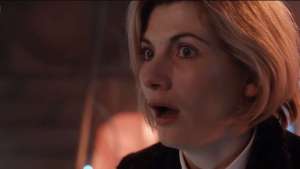 While we’re here, we just saw our first glimpse of the future. Jodie Whitaker’s Doctor saw herself in a screen, beamed the geekiest grin in the world and, in a voice that’s somewhat like David Tennant’s Doctor but not quite, said the now immortal words “Oh brilliant”. Then everything blew up and she fell out her ship, because Doctor Who is happening and this is what new Doctors do.
While we’re here, we just saw our first glimpse of the future. Jodie Whitaker’s Doctor saw herself in a screen, beamed the geekiest grin in the world and, in a voice that’s somewhat like David Tennant’s Doctor but not quite, said the now immortal words “Oh brilliant”. Then everything blew up and she fell out her ship, because Doctor Who is happening and this is what new Doctors do.
Within seconds, I adored Jodie Whitaker. In interviews with her, she just seems to be over the moon to be playing the Doctor, and this sense of wonder translates directly into her take on the character itself. I have never been an actor on-screen look so overjoyed to be playing the role of the Doctor as Jodie did during her first few seconds. After three seasons of Capaldi’s old and tired Doctor, it looks like Whitaker’s going to fully embrace the idea of the Doctor, the happy-go-lucky hero, again.
As good as she was though, there were a few things that niggled. When Whitaker fell out of the TARDIS, my parents said in near-unison “Women drivers, eh?”, which showed me just how much certain sections of the audience are going to have to be guided through Whitaker’s first few episodes so that she becomes “a Doctor” as opposed to “the female one”. It was deflating to have Chibnall finally get to write his female Doctor and immediately produce something so easily reduced into a women driver joke.
And while I don’t want to lapse too much into rumours and gossip, the prevailing theory about the next season of Doctor Who is that it’s going to focus more heavily on a tighter overall plot line which gets advanced every episode. The fact that the TARDIS literally disappears in this episode’s closing shots implies that this overall plot line might be a search for the TARDIS, featuring an Earth-bound Doctor trying to find her way off our planet. Basically, it’d be a modern version of the Pertwee years. The issue with this for me is that I’m not really a big fan of the Pertwee years: because the episodes have a tendency to be really similar to each other and because they have a tendency to be overly padded, I find an awful lot of Pertwee’s episodes to be dreadfully boring. And the BBC books line did a similar story arc during the Wilderness Years which didn’t really work either, mostly because no-one could figure out any plot lines which worked under its remit. It’s not that this idea can’t work, but I don’t think it truly has yet, and I don’t quite trust Chibnall to be the guy to pull it off yet. Chibnall is primarily known by me as a writer who has great ideas but very rarely turns them into something more than adequate. Give him a set-up which has already proved rather difficult to get working in the past and I do worry that this might be setting up for a disappointment.
Which is basically how I’ve felt for a while now: I’m going to love Whitaker’s Doctor and have took to her immediately, but I do think I’m going to have significant issues with Chibnall’s writing and the way the show works under him overall. Then again, I am jumping the gun incredibly here and basing my opinion on a few seconds of television and some internet rumours. The likelihood of the next season of Doctor Who even remotely resembling the one described above is minute. And despite my reservations about Chibnall, I’m still incredibly excited to see Whitaker in action. But, you know, no more scenes which can be so easily reduced into Women Drivers jokes please.
Advertisements Share this:
